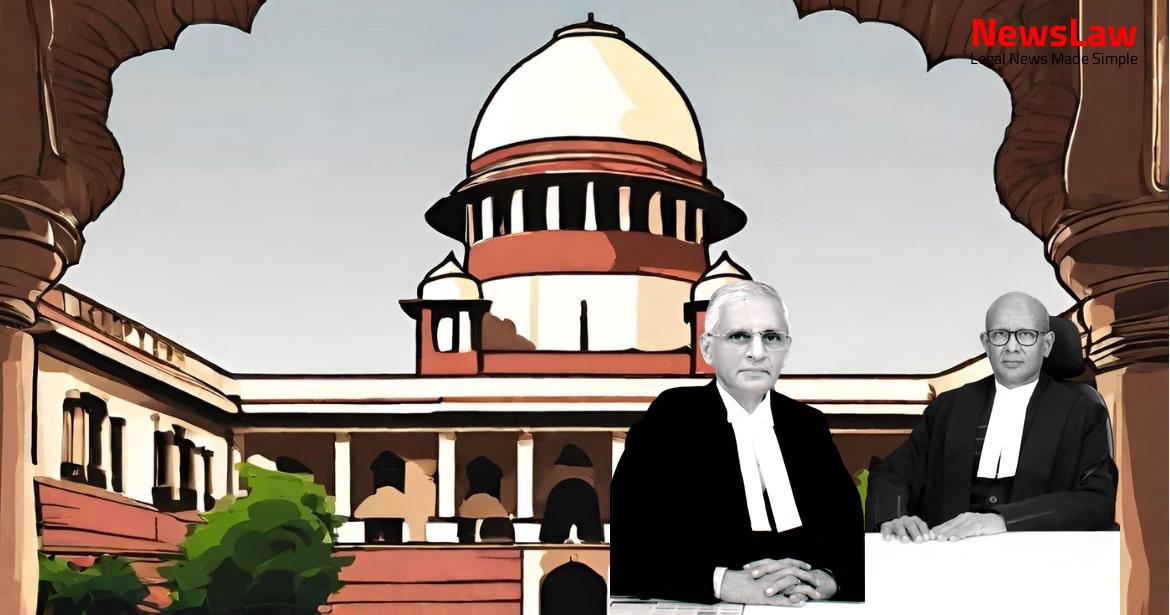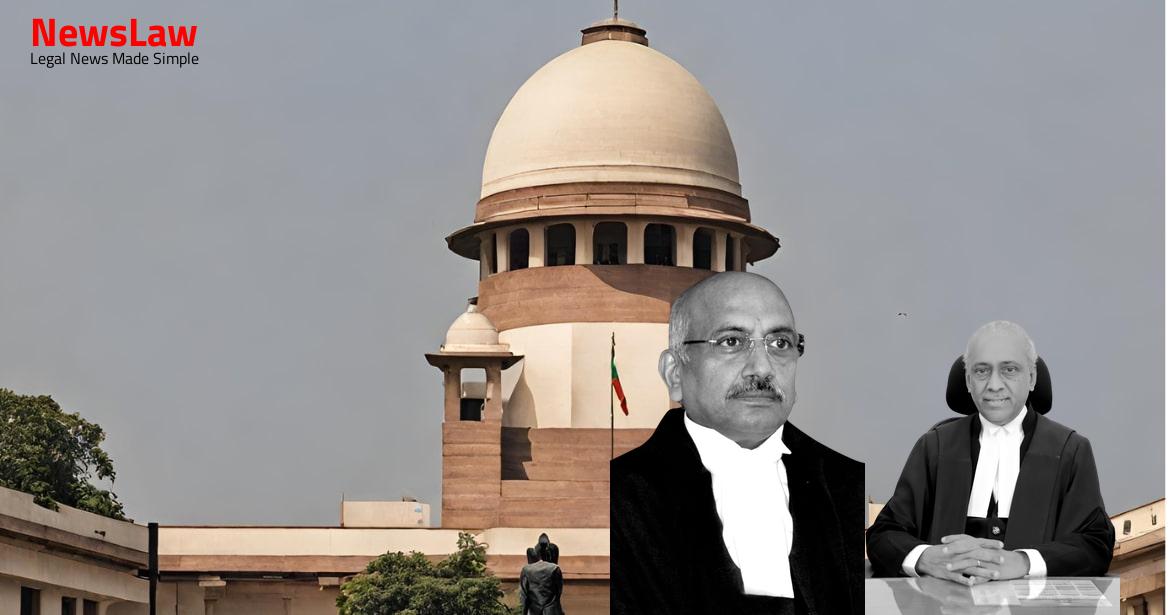Delve into the insightful legal analysis conducted by the court regarding the doctrine of legitimate expectation in public law. The case involves a detailed examination of fairness, non-arbitrariness, and the application of the rule of law in governmental decisions. Stay tuned to learn how these legal principles shape the outcome of the case.
Facts
- The Division Bench of the High Court of Calcutta allowed the appeal and set aside the order of the learned Single Judge in Writ Petition No 661(W) of 2017.
- The State of West Bengal contested the writ petition by filing an affidavit in opposition which was dismissed by the learned Single Judge.
- The Division Bench held that the State of West Bengal failed to justify the decision to recall the vacancies and acted in an arbitrary and unreasonable manner.
- As a result, the Notification dated 17.08.2015 was quashed by the Division Bench.
- Respondent moved application under Article 226 of the Constitution before the High Court of Calcutta.
- Prayed for quashing of Notification dated 17.08.2015.
- Notification canceled declaration of vacancies due to implementation of National Food Security Act, 2013.
- Respondent participated in selection process and was recommended as first priority candidate.
- No final order appointing the respondent was issued by the State Authority.
Also Read: Legal Analysis on Recovery of Excess Payments in Service
Issue
- The issue in this appeal is whether the State of West Bengal was justified in cancelling the declaration of FPS vacancies due to the implementation of National Food Security Act, 2013.
- A Gazette Notification dated 30.01.2014 declared the vacancy for FPS dealership in the District of Alipurduar.
Also Read: Presumption of Marriage in Long-term Cohabitation Cases
Arguments
- State of West Bengal and its functionaries challenged the legality and correctness of the judgment in the appeal.
- The Division Bench failed to appreciate that the number of beneficiaries had been reduced in the State due to the implementation of the 2013 Act, making it unviable to fill up vacancies.
- The respondent participated in the selection process and was successful.
- The selection shown in the Notice dated 30.01.2014 does not give the respondent a justiciable right to agitate before the Writ Court.
- The Notification dated 17.08.2015 was issued in public interest in view of the 2013 Act.
- There is no estoppel against the statute, making the plea of legitimate expectation of the respondent without any basis.
- The respondent argued that she has a legitimate expectation to be treated fairly despite not having a vested right in the appointment.
- Authorities are deemed to have considered the parameters of the 2013 Act while declaring the vacancy on 30.01.2014.
- The respondent’s position was altered to her detriment based on the directions from the State in the notification.
- The 2013 Act was already in force before the notification dated 30.01.2014.
- At this stage, the Authorities are not allowed to retract from their stated position.
Also Read: Court’s Discretion in Extending Time for Deposit of Sale Consideration
Analysis
- The doctrine of legitimate expectation in public law is based on fairness and non-arbitrariness.
- No estoppel can be applied against a statute.
- The State Government was entrusted with implementing the 2013 Act, including reforming the existing Targeted Distribution System.
- The notification declaring vacancies on 30.01.2014 was found to be non-compliant with the 2013 Act and was therefore cancelled.
- Legitimate expectation does not apply when a statute has been enacted.
- No promise was made to continue existing policies, and the State can recall notifications on reasonable grounds.
- Being an applicant in an ongoing selection process does not grant a vested right to demand continuation of vacancies.
- The doctrine of legitimate expectation is a public law right, while promissory estoppel is a private law right.
- The State’s actions in issuing the impugned notification dated 17.08.2015 were not materially irregular.
- It is the State’s duty to act fairly and not arbitrarily, especially in implementing social welfare legislations like the NFS Act.
- The NFS Act represents a shift towards a right-based approach to food security.
- Recalling the vacancy notification to enforce the statute is permissible, as there can be no estoppel against a statute.
- Legitimate expectation is not a distinct enforceable right on its own, but failure to consider it may render a decision arbitrary.
- Decisions must be made in larger public interest and not solely based on individual expectations.
- Legitimate expectation cannot prevail over government policies in public interest when decisions are lawful.
- The doctrine of estoppel does not apply against a statute, and legitimate expectations must align with the law.
- The 2013 Act ensures a right-based approach to food security, providing legal rights to eligible beneficiaries.
- The Act emphasizes eradicating extreme poverty and hunger, aligning with the United Nations’ goals.
- The plea of legitimate expectation does not stand against public policy unless the action amounts to an abuse of power.
- The doctrine of legitimate expectation operates within the rule of law and requires due consideration in decision-making processes.
- Central and State Governments must undertake necessary reforms in the Targeted Public Distribution System in line with the Act.
- State has the power to reform the system by giving preference to public bodies like Panchayats, self-help groups, and cooperatives in licensing and management of fair price shops.
- Authorities did not consider parameters of the 2013 Act while declaring vacancies on 30.01.2014
- No evidence to suggest Authorities thought of 2013 Act provisions when declaring vacancies
- No case of arbitrariness, unreasonableness, or mala fide shown by respondent
- 2013 Act came into effect on 10.09.2013, but vacancy notice is dated 30.01.2014
- Vacancy notice does not mention provisions of the 2013 Act
- Notification dated 17.08.2015 aimed to align public distribution system with 2013 Act, specifically Section 12 for reforms
Decision
- In terms of the order passed in Civil Appeal No. 4254 of 2022, the appeals are allowed.
- The judgment of the Division Bench is set aside, and the judgment of the learned Single Judge is restored.
- Parties are directed to bear their respective costs.
- The appeal succeeds and is allowed. Parties are directed to bear their respective costs.
Case Title: THE STATE OF WEST BENGAL Vs. GITASHREE DUTTA (DEY) (2022 INSC 453)
Case Number: C.A. No.-004254-004254 / 2022



